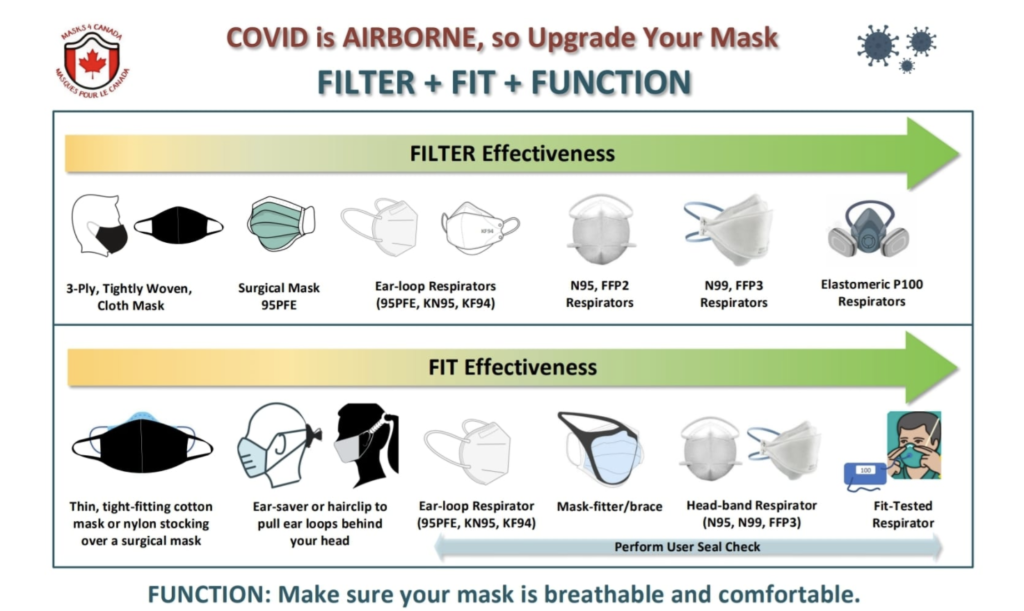[updated Dec 9, 2021]
Masks are a form of personal protective equipment that can be very effective at spreading COVID. In your classroom you should only see masked students and they should all be wearing high quality models that protects all of us from the airborne hazard known as COVID. Here's why.
Student Accessibility Services & Mask Exemptions
First, let's talk about mask exemptions at York University. Up until December 2021 there was an "anything goes" approach to masking on campus. No standards, no enforcement and a finger-wagging "don't you ask anyone about their masks!" message from the central administration. Basically, we were at the mercy of whatever lowest-common-denominator face covering any random person chose (or didn't).
That all changed on Friday, December 3, 2021, when the COVID Advisor for York University paid an unannounced visit to the Lassonde School of Engineering Faculty Council meeting. She stated:
"Student Accessibility Services [SAS] will help to support students who would like to move forward to bring forward, on the basis of medical grounds, an exemption or a request in order to then be able to have an exemption from mask wearing."
Dr. Parissa Safai, YorkU's COVID Advisor
I have been saying that this is the way it should handled for a while now. I agree with Dr. Safai that SAS is the right system to apply to masking exemptions.
On the surface, this means that only people with SAS-approved exemptions will be allowed to be mask-free in a classroom or lab or other indoor space on campus that isn't already approved for mask-free activities (like a designated eating area).
However, from the perspective of a worker's rights (TAs, admin, facilities and technical staff, as well as course instructors), the Ontario Government has stated that masking falls under health and safety regulations. Furthermore, any accommodation provided must not result in reduced protection for a worker:

[update] We, of course, need to accommodate students to ensure equitable learning. While meeting the need for equitable learning, the above also means that a worker in a classroom does not need to accept a maskless or poorly masked student, regardless of the status of the accommodation. The accommodation can absolutely follow a different route than co-location without being inequitable. Note the wording: it's not "should not", it's "must not."
[update] The right to an accommodation does not supersede the right to a safe work environment. Both rights co-exist and both can be met without having an unmasked student potentially spread COVID in the classroom. The emergence of technologies in the last two years, as well as an acceptance of non-traditional teaching methods has shown us that it is possible and practical to do so.
So, instructors need to get ready for mask exemption SAS documents. But, based on what the Government of Ontario is saying, it appears that you do not need to have them in the classroom. Remember: because COVID is airborne, simple distancing is ineffective as a defence mechanism. Students could be accommodated through Zoom or other means since you, as a worker, should not be placed in harm's way with this airborne hazard.
Now, of course, if YorkU's administrators continues to perpetuate the myth that COVID is primarily droplet-based then it becomes harder to deal with the maskless student issue. That would mean that they would have to ignore PHAC's statements on COVID airborne transmission.
What kinds of masks are permitted?
Now, Professor Safai was also asked in the same meeting about masking standards (e.g. N95 vs cloth masks). She is of the opinion that YorkU can't set a standard for masking. Hogwash. Just like the arguments in mid 2021 against vaccine mandates were hogwash. Common sense states that we can tell someone hiding behind a Kleenex that that's not acceptable. Science tells us that N95s are better (by many factors) than the blue procedure masks or cloth masks.
But, for many administrators, masking standards have to be set by lawyers, late to the game "public health" documents or government FAQs. So, let's, once again, make an appeal to authority courtesy of the Ontario Government and its "Using masks in the workplace" webpage:

So, no, cloth masks are not acceptable in the workplace. The Ontario Government says so.
Furthermore the Public Health Agency of Canada says that faceshields, bandanas and scarves are out. See here:

So, say no to face shields, scarves and bandanas in your classroom. So, both the Governments of Ontario and Canada say that we can say "no" to certain types of face coverings because they're not effective against COVID. There is no ethical, legal, public health, practical or human rights argument that holds water for allowing ineffective masking. So stop pretending that there is one.
What about N95s? At the November 2021 Faculty Council meeting in YorkU's Engineering School, we heard that our Dean's Office is now stockpiling N95 masks for distribution to the community. That's a big endorsement for N95 and, if you're in the Lassonde School, you should feel free to send your students to the Dean's Office to pick up their N95s before coming to class.
Conclusion
[update] Everyone in your classroom should be wearing a high quality mask that protects everyone from the airborne hazard that we know COVID to be. No cloth masks. No bandanas. I wouldn't be surprised if we see a shift soon to saying only N95 or better across York. So let's get on board now. Because COVID is airborne. All of this can be done in an equitable way that respects the needs for genuine accessibility and accommodation needs in the classroom.


James Andrew Smith is a Professional Engineer and Associate Professor in the Electrical Engineering and Computer Science Department of York University's Lassonde School, with degrees in Electrical and Mechanical Engineering from the University of Alberta and McGill University. Previously a program director in biomedical engineering, his research background spans robotics, locomotion, human birth and engineering education. While on sabbatical in 2018-19 with his wife and kids he lived in Strasbourg, France and he taught at the INSA Strasbourg and Hochschule Karlsruhe and wrote about his personal and professional perspectives. James is a proponent of using social media to advocate for justice, equity, diversity and inclusion as well as evidence-based applications of research in the public sphere. You can find him on Twitter. Originally from Québec City, he now lives in Toronto, Canada.
